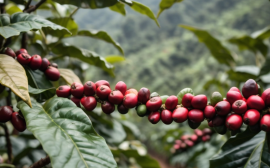Beyond Fair Trade: Unveiling the Direct Trade Coffee Revolution
The comforting aroma of freshly brewed coffee, a daily ritual enjoyed by millions worldwide, often obscures a complex and sometimes troubling reality. Behind each seemingly simple cup lies an intricate network of coffee farmer livelihoods, roasters, distributors, and consumers, all interconnected through a global coffee supply chain. This chain, traditionally fraught with imbalances of power and economic disparity, has prompted various interventions aimed at fostering ethical coffee sourcing. While fair trade coffee certification has long served as a prominent mechanism to address inequities by setting minimum prices and social standards, a more direct and increasingly popular model is emerging within the specialty coffee sector: direct trade coffee.
This approach seeks to bypass conventional intermediaries, fostering more transparent and equitable relationships between coffee roasters and coffee farmers. Direct trade coffee represents a fundamental shift in how coffee is sourced, emphasizing direct engagement and mutual benefit. Unlike the more standardized approach of fair trade, direct trade prioritizes building long-term, personal connections between roasters and farmers. This often involves roasters visiting farms, directly negotiating prices that reflect the coffee’s quality and the farmer’s production costs, and investing in sustainable coffee farming practices and community development initiatives.
The Specialty Coffee Association (SCA) has noted a growing interest in direct trade as consumers increasingly demand transparency and traceability in their coffee purchases, driving roasters to seek out more direct and verifiable sourcing models. This burgeoning trend reflects a desire not only for high-quality beans but also for assurance that coffee farmer livelihoods are being supported. This article delves into the nuances of direct trade, differentiating it from other sourcing models, analyzing its impacts on coffee farmer livelihoods and environmental sustainability, and providing actionable guidance for businesses seeking to build equitable and sustainable coffee relationships. We will explore the benefits and challenges of direct trade, examining how it can empower farmers, enhance coffee quality, and foster more resilient coffee-growing communities. Furthermore, we will address criticisms and ethical considerations surrounding direct trade, including concerns about transparency and scalability. Ultimately, this exploration aims to provide a comprehensive understanding of direct trade coffee as a pathway toward a more equitable and sustainable future for the coffee industry.
Defining Direct Trade: A Relationship-Based Approach
Direct trade is a sourcing model reshaping the coffee supply chain, where coffee roasters circumvent traditional importers and brokers to forge direct relationships with coffee farmers. This proactive approach often entails roasters personally visiting farms, engaging in face-to-face price negotiations, and making tangible investments in coffee farmer livelihoods and their communities. Unlike fair trade coffee, which primarily focuses on setting minimum prices and adhering to specific social standards, direct trade emphasizes radical transparency, exceptional quality, and the cultivation of enduring partnerships grounded in mutual respect and shared values.
This hands-on involvement allows roasters to gain a deeper understanding of the unique challenges and opportunities faced by farmers, fostering a collaborative environment for continuous improvement and innovation in sustainable coffee farming practices. Conventional sourcing, conversely, typically involves procuring coffee through opaque channels, such as commodity markets or intermediaries, with minimal to no direct interaction with the farmers themselves, often obscuring the true cost and impact of each cup. The core principle of direct trade coffee lies in fostering equitable and mutually beneficial relationships throughout the coffee supply chain.
Ethical coffee sourcing extends beyond mere financial transactions; it encompasses a commitment to social responsibility, environmental stewardship, and economic empowerment. Roasters actively seek out farmers who demonstrate a dedication to quality, sustainability, and fair labor practices. By bypassing intermediaries, direct trade allows for a greater share of the profits to reach the farmers, enabling them to invest in improving their farms, processing facilities, and overall quality of life. This direct connection also allows roasters to provide technical assistance, training, and access to resources that can further enhance sustainable coffee farming methods and promote long-term economic viability.
Furthermore, direct trade empowers coffee roasters to curate a truly unique and differentiated specialty coffee offering. By working directly with farmers, roasters gain access to exclusive micro-lots and rare varietals that are not available through conventional channels. This allows them to showcase the distinct terroir and unique characteristics of each coffee, creating a more compelling and engaging experience for consumers. The ability to trace the coffee back to its origin and share the farmer’s story adds a layer of authenticity and transparency that resonates with increasingly conscious consumers. This emphasis on quality and traceability not only benefits roasters and consumers but also incentivizes farmers to continue producing exceptional coffee using sustainable and ethical practices, further solidifying the long-term viability of the direct trade model.
The Benefits of Direct Trade: A Win-Win Scenario?
For coffee farmers, direct trade coffee presents a pathway to higher prices, increased income stability, and greater autonomy over their product, fostering improved coffee farmer livelihoods. By bypassing traditional intermediaries in the coffee supply chain, farmers gain direct access to roasters, enabling price negotiations that reflect the true value of their beans, often exceeding fair trade coffee minimums. This enhanced profitability empowers farmers to reinvest in their farms, improving infrastructure such as processing equipment and storage facilities, ultimately leading to higher quality yields and greater long-term financial security.
Moreover, direct relationships facilitate the exchange of valuable market information, enabling farmers to make informed decisions about crop management and diversification strategies, strengthening their resilience in the face of market fluctuations. Roasters who engage in ethical coffee sourcing through direct trade benefit from access to unique, high-quality beans often unavailable through conventional channels. These specialty coffee beans, sourced directly from specific farms or cooperatives, allow roasters to create distinctive blends and offer consumers a premium coffee experience.
Beyond the superior product, direct trade provides coffee roasting companies with a compelling narrative to share with consumers, highlighting their commitment to sustainable coffee farming and ethical practices. This transparency resonates with increasingly conscious consumers who seek to support businesses that prioritize fair treatment of farmers and environmental stewardship. Furthermore, the direct engagement fosters a sense of partnership and shared values, strengthening brand loyalty and enhancing the roaster’s reputation. The benefits of direct trade extend to the consumer, who gains assurance that their purchase contributes to a more equitable and sustainable coffee supply chain.
By choosing direct trade coffee, consumers actively support coffee farmer livelihoods and sustainable farming practices, knowing that a larger portion of the price they pay reaches the farmers themselves. This transparency fosters a sense of connection to the origin of their coffee, enhancing the overall consumption experience. Furthermore, direct trade often leads to higher quality coffee, as farmers are incentivized to invest in improved farming and processing techniques. Ultimately, consumers benefit from a superior product while contributing to a more just and environmentally responsible industry.
Challenges and Obstacles in the Direct Trade Landscape
Despite its advantages, direct trade faces significant challenges that demand careful consideration. Building and maintaining direct relationships requires a substantial investment of time, resources, and cultural sensitivity. Roasters venturing into direct trade coffee must be prepared to dedicate staff and funds to travel, communication, and relationship management, often navigating language barriers and differing cultural norms. Thorough due diligence is paramount; roasters must meticulously vet potential partners to ensure fair labor practices, environmentally sound sustainable coffee farming methods, and equitable compensation for coffee farmer livelihoods.
This includes verifying land ownership, understanding local regulations, and assessing the overall well-being of the farming community. For farmers, the dependence on a single roaster, while offering potential benefits, can also create vulnerability to market fluctuations or changes in the roaster’s business strategy. The smaller scale inherent in many direct trade coffee operations also presents logistical and market access hurdles. Unlike fair trade coffee cooperatives that aggregate volumes from numerous farmers, individual direct trade arrangements may struggle to meet the demands of larger retailers or distributors.
This can limit the reach of even the highest-quality specialty coffee. Logistical complexities, such as transportation infrastructure limitations in remote coffee-growing regions and navigating intricate customs clearance procedures, further compound these challenges. Furthermore, the lack of independent certification, a hallmark of fair trade coffee, raises concerns about transparency and accountability. While direct trade emphasizes trust and personal relationships, the absence of external oversight can create opportunities for ‘relationship washing,’ where roasters superficially promote their direct trade practices without genuine commitment to ethical coffee sourcing.
To mitigate these risks, several strategies are emerging. Some roasters are forming collaborative networks to share resources and expertise, enabling them to collectively support a larger pool of farmers. Others are investing in infrastructure improvements in coffee-growing regions, such as building drying patios or providing access to transportation. Furthermore, third-party verification services are beginning to offer independent assessments of direct trade relationships, providing consumers with greater confidence in the ethical sourcing claims. Ultimately, the success of direct trade hinges on a commitment to transparency, continuous improvement, and a genuine partnership between roasters and farmers, ensuring that the benefits of this model are shared equitably throughout the coffee supply chain.
Success Stories: Direct Trade Partnerships in Action
One compelling example is the partnership between Intelligentsia Coffee and the Santa Felisa farm in Guatemala. Through direct trade, Intelligentsia has helped Santa Felisa invest in new processing equipment and improve farming practices, resulting in higher-quality beans and increased farmer income. Measurable impacts include a 30% increase in farmer earnings and significant improvements in water conservation practices. Another example is Stumptown Coffee Roasters’ work with farmers in Ethiopia, where they have supported community development projects and helped farmers access financing for farm improvements.
These partnerships demonstrate the potential of direct trade to create positive change. These success stories underscore the transformative potential of direct trade coffee when implemented thoughtfully. Beyond simply paying higher prices, these initiatives often involve providing technical assistance, promoting sustainable coffee farming practices, and fostering greater resilience within coffee farmer livelihoods. For instance, consider the case of Counter Culture Coffee’s relationships in Colombia, where they’ve invested in farmer education programs focused on organic composting and soil health.
These investments not only improve coffee quality but also enhance the long-term environmental sustainability of the farms, demonstrating a commitment to ethical coffee sourcing that extends beyond mere transactions. The impact of direct trade partnerships extends beyond individual farms, often creating ripple effects throughout entire communities. When roasters commit to long-term relationships and fair pricing, farmers are empowered to invest in their families and their communities. This can lead to improved access to education, healthcare, and other essential services, contributing to a more equitable and sustainable coffee supply chain.
Furthermore, the increased transparency inherent in direct trade allows consumers to connect more directly with the origin of their coffee, fostering a greater appreciation for the hard work and dedication of the coffee farmers who make it all possible. This heightened awareness can, in turn, drive demand for ethically sourced coffee and encourage other roasters to adopt similar practices. However, it’s crucial to acknowledge that not all direct trade coffee relationships are created equal. The absence of a universally recognized certification body, unlike fair trade coffee, means that the onus is on roasters to conduct rigorous due diligence and ensure that their partnerships are genuinely beneficial for farmers.
This includes verifying that farmers receive a fair price, have safe working conditions, and are empowered to make decisions about their own businesses. Without this level of scrutiny, there is a risk of ‘relationship washing,’ where roasters use direct trade as a marketing tactic without truly addressing the underlying issues of equity and sustainability within the coffee industry. Therefore, consumers must remain vigilant and seek out roasters who are transparent about their sourcing practices and committed to building truly equitable partnerships.
Addressing Criticisms and Ethical Considerations
Direct trade is not without its critics. Some argue that it lacks the independent oversight of fair trade certification, potentially leading to exploitation. Others question the scalability of direct trade, suggesting it may not be a viable solution for the entire coffee industry. Concerns about ‘relationship washing,’ where roasters use direct trade as a marketing tactic without genuine commitment to ethical practices, are also prevalent. Transparency and accountability are crucial to address these criticisms. The absence of a universally recognized direct trade certification, akin to fair trade coffee, leaves room for inconsistent application and potential abuse within the coffee supply chain.
This necessitates rigorous self-regulation and a commitment to verifiable ethical coffee sourcing practices by coffee roasting companies engaged in direct trade coffee. Independent audits, though costly, can provide an additional layer of assurance and build consumer trust. Furthermore, the focus on individual relationships in direct trade coffee, while beneficial, can inadvertently exclude smaller coffee farmer livelihoods who lack the resources or infrastructure to engage directly with roasters. This raises questions about inclusivity and whether direct trade inadvertently favors larger, more established farms.
Critics also point to the potential for power imbalances in these relationships, where roasters, particularly those specializing in specialty coffee, may exert undue influence over pricing and farming practices. Ensuring fair and equitable agreements requires a commitment to empowering coffee farmers with the knowledge and resources to negotiate effectively. This includes access to market information, legal counsel, and training in sustainable coffee farming techniques. Addressing these challenges requires a multi-faceted approach. The development of industry-led best practices for direct trade, coupled with increased transparency throughout the coffee supply chain, can help mitigate the risk of exploitation and ‘relationship washing.’ Exploring innovative financing models that support smaller coffee farmer livelihoods and promote sustainable coffee farming is also crucial. Ultimately, the success of direct trade hinges on a genuine commitment to building long-term, equitable partnerships that prioritize the well-being of coffee farmers and the sustainability of the coffee industry as a whole. This necessitates moving beyond mere transactional relationships to fostering genuine collaboration and mutual respect.
Actionable Advice: Establishing and Improving Direct Trade Practices
Before entering a direct trade relationship, roasters should conduct thorough due diligence, including visiting farms, verifying farmer ownership, and assessing labor practices. Contracts should be transparent, equitable, and include provisions for price adjustments based on quality and market conditions. Building long-term relationships requires open communication, cultural sensitivity, and a willingness to invest in farmer communities. Government bodies can support direct trade by providing resources and training for farmers and roasters. Effective due diligence in direct trade coffee extends beyond cursory farm visits.
Roasters committed to ethical coffee sourcing must implement rigorous traceability systems, verifying bean origins and scrutinizing labor conditions at each stage of the coffee supply chain. This includes confirming that coffee farmer livelihoods are prioritized through fair wages and safe working environments, aligning with broader sustainability goals. Independent audits, while not always feasible for smaller coffee roasting operations, can provide an additional layer of assurance, mitigating the risk of exploitation and ‘relationship washing’ – a practice where superficial connections mask underlying inequalities.
The Specialty Coffee Association offers resources and guidelines to assist roasters in developing robust due diligence protocols. Contracts are the bedrock of any successful direct trade coffee partnership. These agreements should not only stipulate pricing mechanisms tied to objective quality metrics but also incorporate provisions for pre-financing, risk-sharing in the event of crop failures, and mechanisms for addressing price volatility in the global coffee market. Transparency is paramount; contracts should be written in languages understood by all parties and should clearly outline the rights and responsibilities of both the roaster and the coffee farmer.
Furthermore, contracts should promote sustainable coffee farming practices by incentivizing environmentally responsible techniques and discouraging deforestation. Legal counsel specializing in international trade and agricultural law is invaluable in crafting equitable and enforceable agreements. Building enduring relationships in direct trade coffee requires a commitment that transcends mere transactional exchanges. Roasters should actively invest in the long-term well-being of coffee farmer communities, providing access to technical training, financial literacy programs, and healthcare initiatives. This holistic approach fosters trust and strengthens the resilience of farming communities, enabling them to adapt to climate change and other challenges. Furthermore, roasters can leverage their market access to promote the unique stories and cultural heritage of coffee-producing regions, enhancing the value of their specialty coffee offerings and fostering a deeper connection with consumers. This investment not only benefits the farmers but also strengthens the roaster’s brand reputation and fosters customer loyalty.
Mastering Contract Negotiation: Ensuring Equitable Agreements
Contract negotiation is a critical aspect of direct trade. Contracts should clearly define pricing mechanisms, payment terms, quality standards, and dispute resolution processes. It’s essential to ensure that farmers have access to legal advice and understand their rights. Contracts should also address issues such as crop failure, price volatility, and unforeseen circumstances. Building trust and mutual understanding is key to creating a fair and sustainable agreement. In the realm of ethical coffee sourcing, a well-structured contract serves as the bedrock of a successful direct trade coffee partnership.
Pricing mechanisms, for example, should move beyond simple per-pound rates and incorporate quality premiums tied to cupping scores or other objective measures of bean quality. Payment terms should be clearly defined, specifying timelines and methods to ensure coffee farmer livelihoods are supported with timely compensation. Furthermore, contracts should include provisions for pre-financing or advance payments, allowing farmers to invest in their farms and communities before the harvest even begins. These proactive measures demonstrate a commitment to sustainable coffee farming and foster a stronger, more equitable relationship.
Addressing potential risks is also paramount. Contracts must outline clear procedures for handling crop failures due to weather events or disease, incorporating insurance clauses or alternative sourcing arrangements to mitigate financial losses for farmers. Price volatility, a constant threat in the coffee supply chain, can be addressed through mechanisms like price floors or profit-sharing agreements, ensuring farmers receive a fair return even when market prices plummet. Dispute resolution processes should be clearly defined and culturally sensitive, prioritizing mediation and arbitration over costly and time-consuming litigation.
Including clauses that promote environmental sustainability, such as adherence to specific organic farming practices or reforestation initiatives, further strengthens the ethical foundation of the agreement. Ultimately, mastering contract negotiation in direct trade coffee requires a shift in mindset. It’s not merely about securing the lowest possible price; it’s about building a lasting partnership that benefits all stakeholders. This means investing in farmer education, providing access to resources, and fostering open communication. By prioritizing transparency, fairness, and mutual respect, roasters can create contracts that not only protect their interests but also empower coffee farmers to thrive, contributing to a more equitable and sustainable coffee industry. This approach ensures that the principles of fair trade coffee are upheld and surpassed, leading to genuine, long-term positive impact.
Building Long-Term Relationships: Beyond Fair Prices
Building long-term, equitable relationships requires more than just fair prices; it demands a holistic commitment to the well-being and prosperity of coffee farmer livelihoods. Roasters engaged in direct trade coffee should view themselves as partners in a shared enterprise, investing not only in the beans themselves but also in the communities that produce them. This necessitates providing access to resources such as farmer training programs focused on sustainable coffee farming practices, including soil health management, integrated pest control, and climate change adaptation strategies.
Furthermore, facilitating access to micro-financing and credit can empower farmers to invest in farm infrastructure, processing equipment, and diversification initiatives, thereby strengthening their resilience and reducing their vulnerability to market fluctuations within the global coffee supply chain. Beyond economic empowerment, ethical coffee sourcing entails a commitment to social responsibility and community development. Roasters can contribute to improving access to healthcare, education, and clean water in coffee-growing regions. Supporting initiatives such as building schools, providing scholarships, and funding healthcare clinics can have a transformative impact on the lives of coffee farming families.
These investments not only enhance the quality of life for farmers and their communities but also foster a sense of trust and mutual respect, which are essential for building enduring partnerships. By prioritizing the well-being of coffee-producing communities, roasters can demonstrate a genuine commitment to sustainability and ethical practices, distinguishing themselves from those who merely pay lip service to fair trade coffee principles. Regular communication and feedback are crucial for nurturing trust and ensuring that the direct trade coffee relationship remains mutually beneficial and transparent.
Roasters should actively solicit feedback from farmers on pricing, contract terms, and other aspects of the partnership. This dialogue should be open, honest, and respectful, fostering a sense of shared ownership and accountability. Furthermore, roasters should provide farmers with regular updates on market trends, consumer preferences, and quality expectations, empowering them to make informed decisions about their farming practices and business strategies. By fostering a culture of transparency and collaboration, roasters can build strong, lasting relationships with farmers, creating a more equitable and sustainable coffee supply chain that benefits all stakeholders. As one farmer aptly put it, ‘Direct trade is not just about money; it’s about respect and partnership,’ a sentiment that underscores the importance of building relationships based on mutual trust and shared values within the specialty coffee industry.
The Future of Coffee: A More Equitable and Sustainable Cup
Direct trade coffee represents a promising alternative to conventional sourcing models, offering the potential for greater equity, sustainability, and quality. While challenges remain, the success stories of direct trade partnerships demonstrate its transformative power. By prioritizing transparency, building strong relationships, and investing in farmer communities, the coffee industry can create a more just and sustainable future for all. However, realizing this vision requires a critical examination of the nuances within direct trade itself. The absence of a universally recognized direct trade certification, unlike fair trade coffee, necessitates rigorous due diligence from coffee roasting companies to ensure ethical coffee sourcing practices are genuinely implemented and that coffee farmer livelihoods are improved, not just superficially addressed.
This includes verifying farm ownership, labor conditions, and environmental stewardship through on-site visits and transparent data sharing. Sustainable coffee farming hinges on empowering farmers within the coffee supply chain to adopt environmentally sound practices and improve the quality of their yields. Direct trade relationships can facilitate this by providing access to training, resources, and premium prices for high-quality, sustainably grown beans. For instance, roasters can invest in farmer education programs focused on organic farming techniques, water conservation, and biodiversity preservation.
Furthermore, direct trade can enable farmers to diversify their crops, reducing their reliance on coffee and increasing their resilience to climate change. This holistic approach not only benefits the environment but also enhances the long-term economic viability of coffee-growing communities. Ultimately, the evolution of direct trade hinges on fostering genuine partnerships built on mutual respect and shared values. This means moving beyond mere transactions and actively engaging with coffee farmer livelihoods, understanding their challenges, and collaborating on solutions. Roasters should strive to provide farmers with access to market information, financial resources, and technical assistance, empowering them to make informed decisions and improve their farming practices. By fostering long-term relationships and investing in the well-being of coffee-growing communities, the specialty coffee industry can create a truly sustainable and equitable future for all stakeholders.



